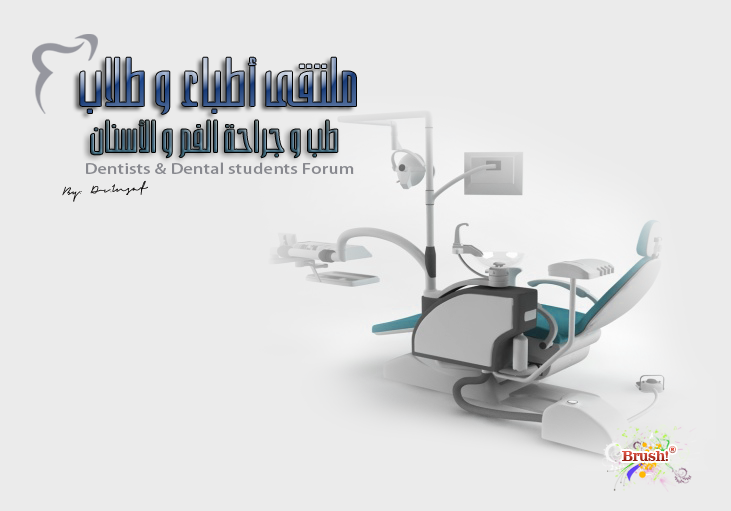Dr.Insaf
المدير العام

 عدد الرسائل : 997 عدد الرسائل : 997
العمر : 41
الموقع : https://www.facebook.com/pages/Brush/187262171338671
المزاج : الحمد لله تمام
احترام المنتدى : 
السنة الدراسية : Internal ship
تاريخ التسجيل : 07/02/2009
 |  موضوع: What is paresthesia? موضوع: What is paresthesia?  الأربعاء سبتمبر 15, 2010 5:23 pm الأربعاء سبتمبر 15, 2010 5:23 pm | |
| What is paresthesia?
What is paresthesia?Paresthesia (or persistent anesthesia) is any alteration in sensation following a local anesthetic injection that persists more than 24 hours after the injection was administered. For example, when a patient leaves the dental office 1 hour after receiving an injection, the patient is still numb because the anesthetic is continuing to work in a normal manner. After 6 or 7 hours, the patient will most likely report that the numb sensation is gone. However, as people respond differently, some will experience anesthesia that lasts longer. I try not to label a patient as having a paresthesia in less than 24 hours after the initial injection. If after 24 hours, the patient continues to experience residual loss of sensation, I would diagnose this as a paresthesia.
Is paresthesia ever permanent?
It is extremely rare for a patient receiving local anesthesia in a dental office to never lose it, meaning that the area remains as numb as it was after the injection was given. More commonly patients remark:“A little area on the tip of my tongue on the right side is numb” or“The lateral border of my tongue on the right side still feels funny.”Or perhaps their sense of taste has diminished. One of the reasons for reduced sense of taste is that the chorda tympani nerve, which supplies the sensation of taste, is located within in the lingual nerve.
Most paresthesias resolve within 10-14 days, but I always advise patients that it may take up to 6 months. Virtually all paresthesias that are transient resolve within 6 months. On rare occasion, a paresthesia maybe permanent.
What causes paresthesia?
The most likely cause of paresthesia is trauma from the needle, ie,direct needle contact with the nerve. The most commonly reported area where paresthesia occurs is in the mandible. Within mandibular paresthesia, the majority involve the lingual nerve and a smaller number involve the IA nerve.
With IA nerve involvement, a patient will complain of some residual loss of sensation in his or her lower lip, perhaps on the buccal gingiva, and also potentially on the chin. With lingual nerve paresthesia or injury,a patient will complain of a loss of sensation on part of his or her tongue.
The mandible is the most common site of reported paresthesia because the IA nerve block is the most used injection technique. The lingual nerve is situated in proximity to the needle insertion site, located 5 mm or 6mm below the surface mucosa. As we cannot see where our needle is going, it is impossible to prevent needle-nerve contact 100% of the time.
Most dental professionals who give a lot of injections experience the occasional patient who jumps as the needle is advanced through the soft tissue during an IA nerve block. The typical response is to immediately pull the needle out because it’s unclear what has happened. When asked what happened, the patient’s response is usually, “I felt an electric shock on my tongue.” Essentially, the needle contacted the nerve. This contact does not always cause paresthesia but if contact occurs and the patient does experience paresthesia, then the cause is clear: direct contact trauma from the needle.
Other complications
Another possible cause of paresthesia is a hematoma. When a needle goes through soft tissue, there are small blood vessels in the area. Small blood vessels also exist within the nerve. A needle contacting a blood vessel ruptures it and blood flows into the area. Blood in contact with the nerve irritates it and can produce paresthesia. The area of the IA nerve block is quite vascular so this is a possible cause of paresthesia.
A hematoma usually resolves within 10-14 days as the blood is resorbed.What normally happens when the hematoma is the cause of paresthesia is that the patient will report a gradual return of sensation over about10-14 days.
Edemais another possible cause of paresthesia. This happens more often following surgical extraction of third molars but any edema or tissue injury can produce paresthesia. A paresthesia that arises following a surgical procedure or a traumatic dental procedure, resolving within4-7 days is likely to have been caused by edema.
Currently,there is a buzz in dental circles that 4% local anesthetics may be associated with a higher incidence of paresthesia than 3% or 2% drugs.I personally remain unconvinced that this is the case. In my opinion,at the present time, there is no substantial scientific evidence that supports the statement that 4% anesthetics present a higher risk of paresthesia than other drugs.
..................... From [ندعوك للتسجيل في المنتدى أو التعريف بنفسك لمعاينة هذا الرابط] | |
|
سيف الطويري
مشرف سابق


 عدد الرسائل : 65 عدد الرسائل : 65
العمر : 39
العمل/الترفيه : senior sales supervisor hekma PLC pharmaceutical company
المزاج : الحمد لله ديمه كويس
احترام المنتدى : 
السنة الدراسية : 4th Grade Dentistry
تاريخ التسجيل : 13/10/2010
 |  موضوع: رد: What is paresthesia? موضوع: رد: What is paresthesia?  الجمعة أكتوبر 15, 2010 1:10 pm الجمعة أكتوبر 15, 2010 1:10 pm | |
| | |
|
زهرة البنفسج
نائب المدير


 عدد الرسائل : 583 عدد الرسائل : 583
العمر : 38
احترام المنتدى : 
السنة الدراسية : Internal ship
تاريخ التسجيل : 05/10/2010
 |  موضوع: رد: What is paresthesia? موضوع: رد: What is paresthesia?  الجمعة أكتوبر 15, 2010 8:40 pm الجمعة أكتوبر 15, 2010 8:40 pm | |
| | |
|




